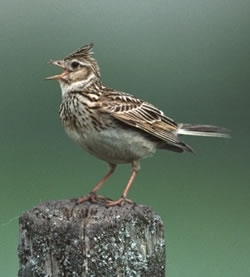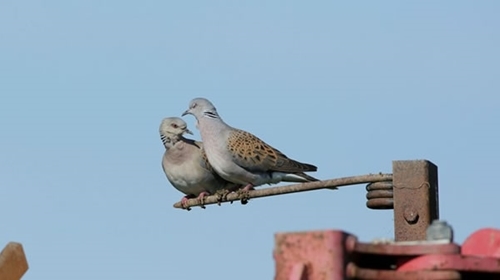 This blog post originally appeared on the RSPB's blog on 13th January 2016.
This blog post originally appeared on the RSPB's blog on 13th January 2016.
Farmland birds have been in decline for several decades, mainly due to changes in the way we farm. Some of the species that have declined are real icons of our countryside: grey partridge, lapwing, turtle dove, skylark and yellowhammer. Hearing skylarks singing in the spring and the purring of turtle doves in the summer gives nearly everyone who hears and sees them a real lift.
Despite the best efforts of many conservation charities and organisations, and the agri-environment schemes that have been available to farmers for several decades these declines continue. For one species in particular, turtle dove, there is a very real possibility that it could go extinct as a breeding bird in Britain within our life time.
There are many farmers who do care passionately about the wildlife on their farms. They will be providing safe nesting habitat, abundant seed food in the winter and plentiful insect food, mainly on flower rich areas, on their farms often supported financially by agri-environment schemes.
Some farmers are incredibly knowledgeable about the wildlife on the farms, others may wish a little help in understanding the needs of wildlife so they can do their bit to help them. A crucial stepping stone to helping wildlife is to be able to identify what is on the farm. Some species, often large and with striking colour patterns, are easy to identify but others are often tricky. Those little brown birds that never sit still, are too far away or are often only seen in flight.
In 2014 the Game Wildlife Conservation Trust (GWCT) began a project called the Big Farmland Bird Count. This encourages farmers to take a walk around their farm in February, identify and record the number of each species they see and send their results to GWCT. In 2015 over 950 farmers took part, recording 127 species on their farms. A real success.

The aim is to make the 2016 count even bigger and encourage even more farmers to take part. To help them GWCT have organised a series of Bird Identification workshops across Britain in January and early February. At the workshops experts from GWCT and other conservation charities and organisations will be there to talk about some of the tricky species, how to identify them by sight and sound, and also the crucial bit: how to help those species become more common on their farms.
If you are interested in attending one of the workshops details can be found here. Book a place quickly though as some of the workshops have sold out and many only have a few places left.
One of the workshops is taking place at RSPB Hope Farm in Cambridgeshire. We’re delighted to be able work alongside GWCT and farmers to raise the profile of farmland birds. If you are attending the workshop at Hope Farm then I am really looking forward to welcoming and meeting you, if you are at another workshop then I hope you have a really great day.
But most of all I would encourage you to take part in the Big farmland Bird Count in February.